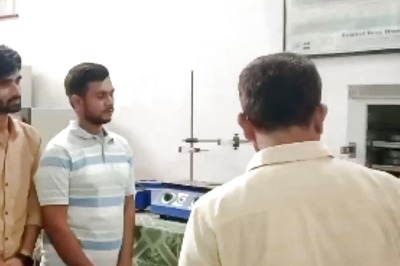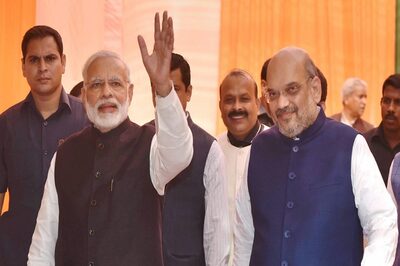
views
External affairs minister S Jaishankar on Monday said the status of India-China bilateral ties is ‘not good, not normal’ during an interaction with mediapersons in Tokyo on the sidelines of the Quad foreign ministers’ meeting.
“The relationship right now with China is not good, not normal. As a neighbour, we hope for a better relationship, but that can only happen if they respect the LAC and respect agreements which they have signed in the past,” Jaishankar said.
“We have views on China based on our experience,” the minister said.
“Our relations with China are not doing very well, the main reason for that is in 2020, during the COVID, China brought very large forces to the border areas between India and China in violation of agreements that we had with China and that created tensions which led to a clash, people died on both sides,” Jaishankar said, referring to the Galwan Valley clashes in which 20 Indian soldiers and an unknown number of Chinese troops were killed there on June 15, 2020.
“The consequences of that continue as the issue has not been fully resolved,” he said.
He ruled out any role for a third party in India’s border dispute with China, saying the two neighbours have an issue and it is for them to find a way out.
“We are not looking to other countries to sort out what is really an issue between India and China,” Jaishankar said.
“We have a problem, or, I would say, an issue between India and China…I think it is for two of us to talk it over and to find a way,” he said.
“Obviously, other countries in the world would have an interest in the matter, because we are two big countries and the state of our relationship has an impact on the rest of the world. But we are not looking to other countries to sort out what is really an issue between us,” he said, recalling his meeting with Chinese Foreign Minister Wang Yi twice this month.
Jaishankar and Wang met last week in the Laotian capital where they participated in the meetings of the Association of Southeast Asian Nations (ASEAN).
During their meeting, they agreed on the need to give strong guidance to complete the disengagement process following the military standoff in eastern Ladakh in May 2020.
India has been maintaining that its ties with China cannot be normal unless there is peace in the border areas.
Jaishankar’s remarks came amid the dragging border row in eastern Ladakh that entered its fifth year in May.
On July 4, Jaishankar and Wang met in the Kazakh capital city of Astana on the sidelines of the summit of the Shanghai Cooperation Organisation (SCO).
The Indian and Chinese militaries have been locked in a standoff since May 2020 and a full resolution of the border row has not yet been achieved though the two sides have disengaged from a number of friction points.
The ties between the two countries nosedived significantly following the fierce clash in the Galwan Valley in June 2020 that marked the most serious military conflict between the two sides in decades.
The two sides have so far held 21 rounds of Corps Commander-level talks to resolve the standoff.
India has been pressing the People’s Liberation Army (PLA) to disengage from the Depsang and Demchok areas.
The two sides held the last round of high-level military talks in February.
Though there was no indication of a breakthrough at the 21st round of talks, both sides agreed to maintain “peace and tranquillity” on the ground and continue the communication on the way ahead.
Quad Resolutions
The foreign ministers from Japan, the US, Australia and India compiled a set of measures to reinforce maritime safety and cybersecurity and to support other Asia-Pacific countries in improving their defences during growing tensions in the regional seas.
After the meeting, Japanese Foreign Minister Yoko Kamikawa, US Secretary of State Antony Blinken, Australian Foreign Minister Penny Wong and External Affairs Minister Subrahmayam Jaishankar said they were “seriously concerned” about the tensions and expressed “strong opposition” to unilateral changes to the status quo by coercion.
At what are known as the Quad talks, the four ministers agreed on a number of initiatives to counter cyberattacks, ensure maritime security and deal with disinformation. They also announced expanded support for other countries, including in Southeast Asia and Pacific islands, to bolster their abilities in those areas as the Quad seeks to expand its partnerships.
The Quad is committed to improving the lives of people across the Indo-Pacific region and beyond. From increasing maritime domain awareness to helping the region prevent cyber attacks, we are investing in the region’s success. pic.twitter.com/4KSoNvGhvI— Secretary Antony Blinken (@SecBlinken) July 29, 2024
“The Quad is committed to improving the lives of people across the Indo-Pacific region and beyond. From increasing maritime domain awareness to helping the region prevent cyber attacks, we are investing in the region’s success,” Blinken said in a post on social media site X.
(with inputs from PTI)




















Comments
0 comment